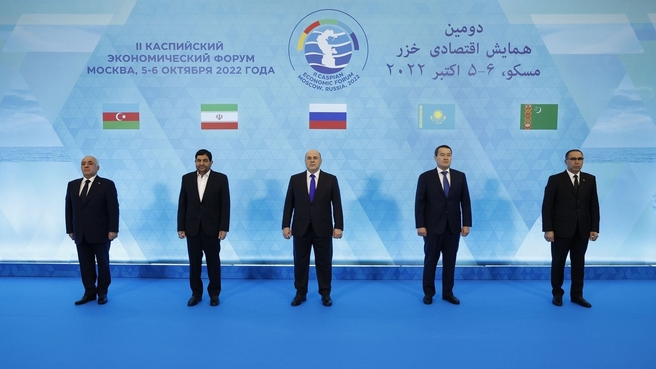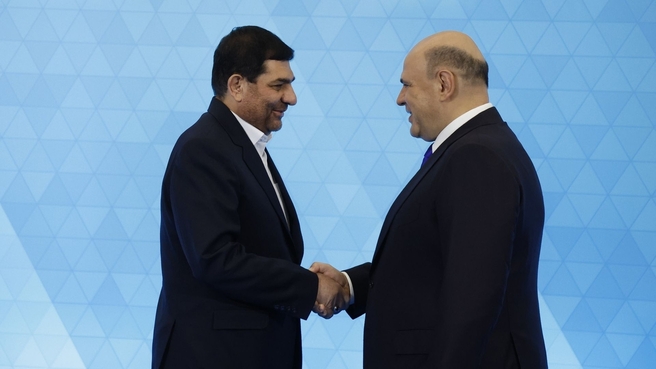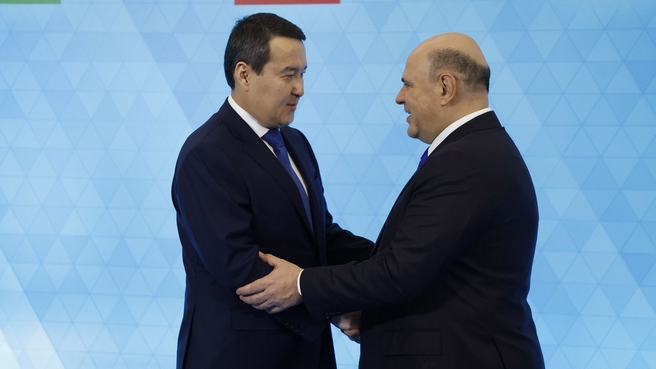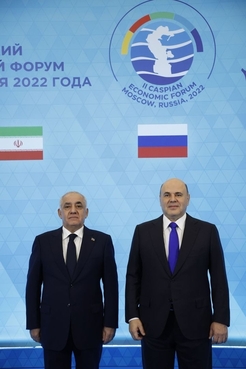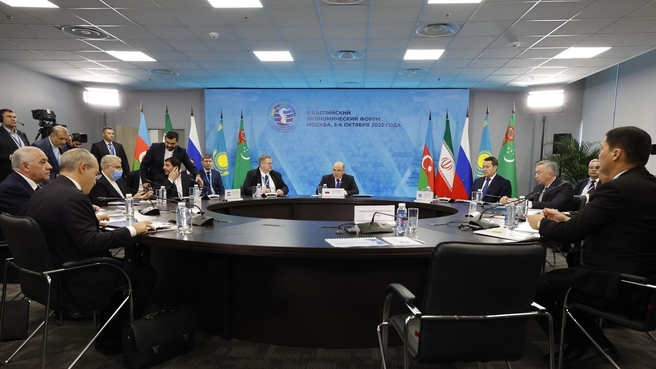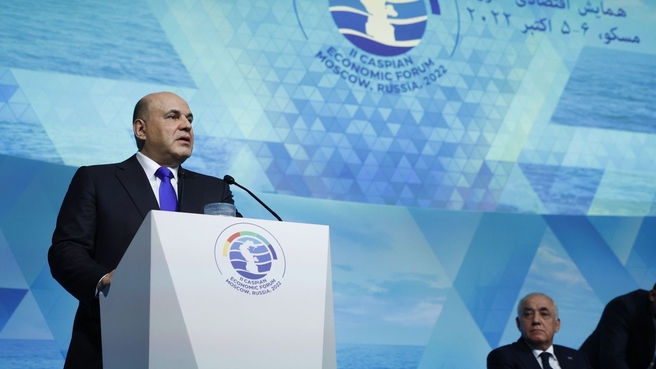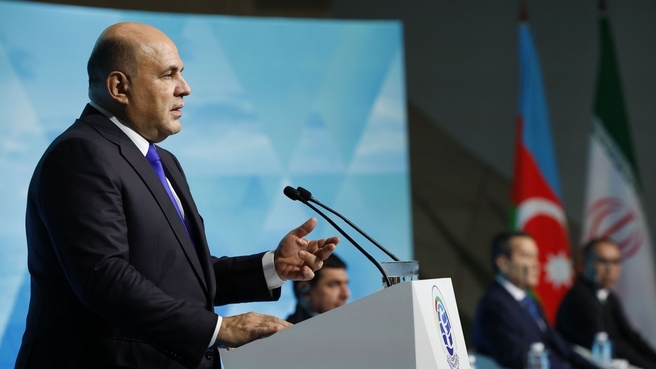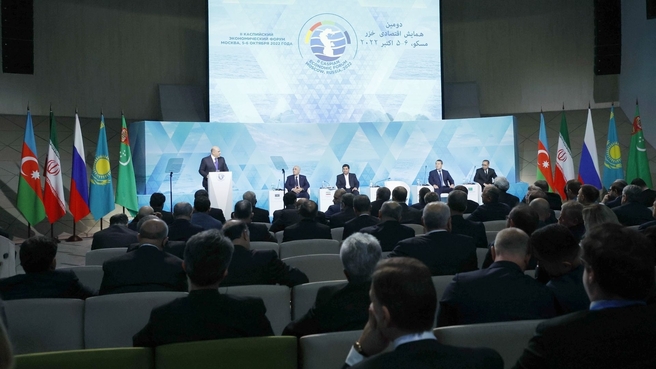Mikhail Mishustin chaired a meeting of heads of participating countries’ delegations and spoke at a plenary meeting of the 2nd Caspian Economic Forum.
Mikhail Mishustin’s remarks at a plenary meeting of the 2nd Caspian Economic Forum
Mikhail Mishustin’s closing remarks at the plenary session of the 2nd Caspian Economic Forum
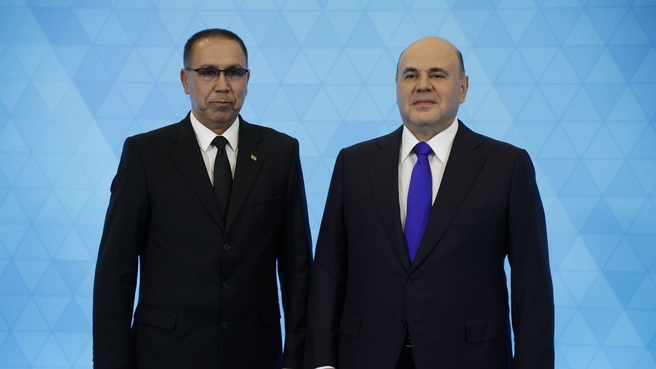
Mikhail Mishustin and Deputy Chairman of the Cabinet of Ministers of Turkmenistan Khodjamyrat Geldimyradov
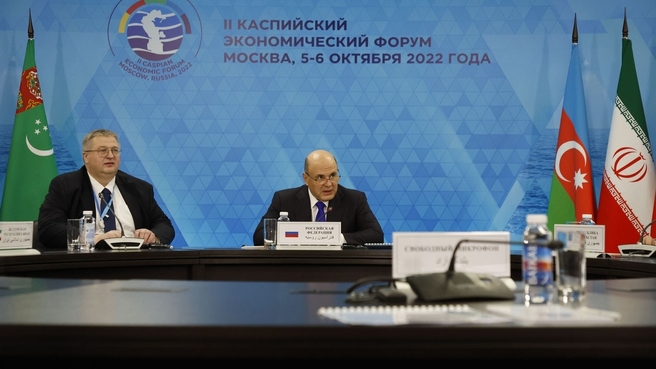
Restricted attendance meeting of heads of delegations from countries participating in the 2nd Caspian Economic Forum
Joint photo of the heads of delegations from countries attending the 2nd Caspian Economic Forum
On 5-6 October, 2022, Moscow is hosting the 2nd Caspian Economic Forum, the largest post-pandemic event for discussing topical issues of cooperation between Caspian countries, as well as friendly neighbouring states. Representatives of Russia, Azerbaijan, Iran, Kazakhstan and Turkmenistan are discussing topical cooperation issues.
On 6 October, Prime Minister of the Russian Federation Mikhail Mishustin, Prime Minister of the Republic of Azerbaijan Ali Hidayat oghlu Asadov, Prime Minister of the Republic of Kazakhstan Alikhan Smailov, First Vice President of the Islamic Republic of Iran Mohammad Mokhber and Deputy Chairman of the Cabinet of Ministers of Turkmenistan Khodjamyrat Geldimyradov will attend a plenary meeting of the 2nd Caspian Economic Forum.
Over 1,000 participants,
including those from the Russian Federation, four other Caspian countries,
Belarus, Kyrgyzstan and Uzbekistan, registered for the 2nd Caspian
Economic Forum. They are discussing key issues of cooperation in trade, economy,
science and technology in the Caspian region, prioritising joint projects in such
areas as transport infrastructure, energy, environmental protection, as well as
expanded inter-regional collaboration and cultural and humanitarian ties.
Mikhail Mishustin speaks at a restricted attendance meeting of the heads of delegations at the 2nd Caspian Economic Forum:
Good morning, colleagues.
I want to welcome the government delegations from Azerbaijan, Iran, Kazakhstan and Turkmenistan at the 2nd Caspian Economic Forum.
The Russian Federation has taken over the presiding role in this format from Turkmenistan, which organised the first forum on 12 August 2019 in Turkmenbashi.
This meeting continues the agenda of the 6th Caspian Summit that took place on 29 June in Ashgabat. The heads of state discussed the most topical issues of cooperation in the Caspian region, proposed a range of new initiatives in the economy, trade, energy, transport and culture, as well as a great number of environmental initiatives.
I suggest that, in this restricted attendance format, we agree on the parameters of this joint work to perform the tasks set by the leaders of the Caspian states, and discuss the most promising economic projects that we can launch in this five-party format.
Our agenda is extensive and constructive. I am confident that, as an outcome of today’s meeting, we will develop specific solutions to give a new impetus to our multi-dimensional cooperation in the Caspian region, solutions that will eventually improve the prosperity and wellbeing of our citizens.
Mikhail Mishustin’s remarks at the plenary meeting:
Good afternoon, friends,
Ladies and gentlemen,
I am delighted to welcome you to Russia, to the 2nd Caspian Economic Forum, which was instituted at the initiative of Turkmenistan. The 1st Caspian Economic Forum was held three years ago in Turkmenbashi, and its participants focused on trade and economic interaction between the Caspian Five.
I would like to thank our colleagues for supporting the proposal to hold the forum in Moscow.
Before I begin my remarks, I would like to say a few words about today’s date, which has special significance for Turkmenistan and its people. This is a day of memory for the victims of the Ashgabat earthquake.
Seventy-four years ago, one of the most devastating disasters of the 20th century claimed the lives of tens of thousands of people, damaged buildings, enterprises and virtually destroyed the entire city. This became a real tragedy, and no one remained indifferent. Our entire vast country responded to the pain of the Turkmen people. Russia and all other Soviet republics helped rebuild the city.
I would like to offer my sincere condolences to the people of Turkmenistan and those who lost their loved ones during that earthquake.
And now, let us move on to the main subject of this forum. This is a follow-up to the 6th Caspian Summit, held this past June in Ashgabat. The leaders reaffirmed their shared commitment to expanding partnership in the most diverse spheres, adopted decisions on advancing cooperation between the five states and proposed new initiatives.
Today, we held a restricted attendance meeting and discussed the pace of work to achieve these goals, and I am grateful to all participants for their fruitful and constructive proposals.
The forum serves as a platform for discussing the most topical issues concerning our region. Proposals on strengthening cooperation in many areas, from energy and transport to investment and tourism, are developed with the involvement of government officials, representatives of regions, and the business and expert communities.
The Caspian region is of great importance to Russia – mainly because of its strategic position in Central Eurasia, at a crossroads of transport and energy arteries, as well as the great amount of minerals and unique biological resources in its waters.
And of course, it is also a place where cultures, civilisations and religions meet; a place where people of different ethnicities and faiths treat each other with kindness and respect.
These traditions live on. Our interests may differ, but we are capable of finding mutually beneficial solutions through dialogue.
During the summit in Ashgabat, President Vladimir Putin stressed that further expanding trade and investment links and deepening mutually beneficial cooperation in industrial production and high technologies are among the key objectives for our five countries.
The Caspian region is among the fastest developing areas. Over the past 20 years, its aggregate GDP grew almost three times and mutual trade five times.
In the past five years, our countries’ share in the global GDP increased to 3.6 percent and mutual trade by 50 percent.
Russia and other Caspian littoral states enjoy good results in terms of trade volume. As of 2021, our trade grew almost one-third. Of course, it is important to maintain this trend in the future.
We will have to operate in challenging conditions, considering the turbulent global economy and geostrategic tensions. In its attempts to maintain the existing and convenient world order, the collective West is exerting more pressure on other countries, especially those that are defending their national interests and refuse to play by the Western rules. Russia is one of them.
Last week, we signed treaties on the accession of the Donetsk and Lugansk people’s republics and the Zaporozhye and Kherson regions to the Russian Federation.
The State Duma and the Federation Council approved the federal constitutional laws on the incorporation of these territories into Russia. The laws have already been signed by President Putin.
Russia has incorporated the regions whose residents have always been with our country spiritually and culturally. They joined Russia through their residents’ free expression of will in referendums. The absolute majority voted for joining the Russian Federation.
This historic and life-changing decision triggered another wave of pressure from the collective West. However, the language of ultimatums is unacceptable to us. No state has the right to impose its will on others, even more so use methods of pressure that affect the interests of ordinary citizens and private businesses.
Russia is the world’s most sanctioned country. It is subject to more sanctions than any other state ever was.
The Government has taken steps to offset the impact of this, and the Russian economy is proving its ability to adapt to these external challenges. Consumer demand is gradually recovering, supported by a stable labour market. Investment was active in the first half of the year, while annual inflation slowed from a peak of 17.8 percent in April to 13.5 percent last week.
All these positive results have been achieved mainly through the Government’s Priority Action Plan, compiled at the President’s instructions and aimed at promoting economic growth under the sanctions. It include over 300 specific measures to support businesses and individuals.
We expect that in a little more than a year, the economy will return to steady growth and that the gross domestic product will continue to grow in 2024-2025, primarily driven by domestic demand – consumer and investment – and thanks to the achievement of strategic priorities. Growth will include the development of Russia’s transport and logistics infrastructure, which will accommodate the redirection of export-import flows. Russia will consolidate its technological sovereignty, support private investment and the financial market, and meet the objectives required to achieve the national goals approved by the Russian President.
We are fully aware that the sanctions will be with us for a long time. Our priority here is to protect the Russian people’s interests and meet the national economy’s needs. We will continue to evaluate the possible risks and mitigate the impact of the anti-Russia sanctions, to improve existing tools and develop additional response mechanisms.
As President of Russia Vladimir Putin noted, the world has entered a period of a fundamental, revolutionary transformation. New centres of power are emerging, and the Caspian region is one of them.
We have to make every effort to maintain stability and security in the Caspian region relying on neighbourly relations, trust and mutual respect among the regional states.
And of course, their collective potential needs to be unleashed.
I would like to talk more specifically about a few areas for cooperation now.
It is important to take coordinated steps to develop the region’s transport and logistics capabilities, to develop it as one of the largest transcontinental transport hubs in Eurasia. This will boost the development of regional markets, build up trade and industrial cooperation.
We have estimated the potential freight volume that can be transported through the North-South Transport Corridor network. Last year, traffic was about 14 million tonnes. The system offers an almost twofold growth potential by 2030. This means that we need to simultaneously remove any barriers on the railway network and at checkpoints. This will create the right conditions for the launch of seamless logistics services to ship goods from the Urals, from the Volga region and the Baltic region – from all over Russia all the way to the Persian Gulf, and further on to South Asia and the Middle East, to Africa. This will give an additional impetus to regional and cross-border trade.
It is essential to shift mutual transactions to national currencies and to develop an independent financial market infrastructure. Russia has a financial messaging system of its own, and more and more banks are joining this system. We are establishing links between the payment systems of our partners from friendly countries, and expanding the geography of using Mir cards. This is important for payment and transaction reliability and for user convenience.
Another strategic goal for the five Caspian nations is to deepen business cooperation and build new value chains. Each of our countries is striving to overcome dependence on imported products, implementing special programmes for this. In Russia and Kazakhstan, almost all industries are on the list of sectors and priority products for import substitution. Turkmenistan has similar plans. Iran can share its experience in expanding production for many years under Western sanctions.
We are open to cooperation with our partners in all these areas.
Colleagues,
Not only do we share a common view of our current issues, but we also have respect for our history, a desire to maintain our national identities and our people’s traditions.
The idea of drafting a five-sided agreement on culture was proposed during the summit in Ashgabat. We support this initiative.
Cooperation with the Caspian states in the field of culture is mostly developing now in bilateral formats. It’s time to complement this practice with multilateral interaction.
I suggest discussing our ideas on holding a Caspian film festival and exhibition projects. Such events will strengthen the unity of our nations and help us understand each other better and learn more about our neighbouring countries’ culture.
There is a lot of potential in the sphere of tourism.
The Caspian shore can attract at least a million tourists annually. It has huge potential, especially considering its unique nature and possibilities for active and recreational tourism.
We should sign practical agreements between our states, which will help us build up tourist exchanges.
Iran has submitted a draft agreement on Caspian state cooperation in the field of tourism for our consideration. An agreement has been drafted at Azerbaijan’s initiative to jointly organise cruise tourism on the Caspian Sea.
I invite you to expedite the coordination of these documents and to hold regular meetings of senior tourism officials. By working together, we will be able to create competitive travel products and open new routes, including cruise tourism with calls at our ports.
Another important issue has to do with environmental protection.
This acquires special significance when referring to the Caspian region. The five Caspian states are directly responsible for the environmental well-being of the region and the balanced use of the Caspian Sea’s natural resources.
We must coordinate our actions to maintain the biological diversity of the sea. Moreover, we must be proactive in preserving this unique natural asset for future generations.
Colleagues, friends,
President of Russia Vladimir Putin proposed the idea of the Greater Eurasian Partnership, which provides for developing mutually beneficial trade and economic cooperation among the largest regional associations. The Caspian Five has a special role to play in this.
Our meeting today has reaffirmed the high level and the strategic nature of cooperation among the Caspian states. The main thing is that our interaction is based on mutual trust, respect and common approaches. These principles have been incorporated in the draft of our joint statement.
I am confident that the Caspian Economic Forum, with its busy agenda and substantive discussions, will make a major contribution to addressing the tasks of our region. I would like to wish all of us success in this undertaking.
Mikhail Mishustin’s closing remarks at the plenary session of the 2nd Caspian Economic Forum:
Friends, I would like to express our deep gratitude to the heads of the delegations for the ideas and proposals they have put forth in their statements.
We have agreed to adopt a joint statement on the outcome of our forum, which will include the guidelines for future cooperation within the framework of our five-sided agreement.
All of us are aware of our responsibility for the future of the Caspian region, and we are resolved to stand up against the existing challenges. Our unconditional priority is to implement the decisions adopted by the leaders of the Caspian Five. We will take measures to expand our trade and economic cooperation, promote our partnership in various spheres and enhance the investment attraction of the region as a whole.
We are unanimous that all issues arising in the Caspian region must be decided exclusively and peacefully on the basis of mutual respect, trust and a balance of interests. Only in this way can we ensure the stable development of the Caspian region and hence the prosperity of our citizens.
